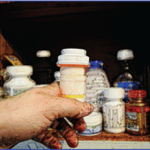 by Muhammad Hassan Majeed, MD
by Muhammad Hassan Majeed, MD
Dr. Majeed is an Attending Psychiatrist at Natchaug Hospital, Norwich, Connecticut.
Innov Clin Neurosci. 2017;14(5–6):25–27
Funding: No funding was received for the preparation of this article.
Financial Disclosures: The author has no conflicts of interest relevant to the content of this article.
Keywords: Opioids, diversion, safety, confidentiality, adolescents
Abstract: Patients receiving end-of-life or palliative care usually possess an ample supply of pain medications to help alleviate their pain. The risk of these drugs being diverted is high because such patients often have an excess of these medications, and because they are typically unable to manage medications themselves. For example, adolescents might steal these medications for recreational use. The author presents a case in which a minor admitted stealing and using opioid pain medication belonging to her mother, who was in hospice home care. Using the minor’s right of confidentiality, she clearly instructed the treatment team not to contact her family about her substance use. This caused a significant professional and ethical dilemma, forcing the team to consider the minor’s rights of confidentiality in addition to safety.
Introduction
Substance use co-morbid with depression is a relatively common presentation among adolescents in the clinical setting.[1] In 2014, an estimated 1.3 million youths (12–17 years of age) in the United States had a substance use disorder. About 0.7 percent of the adolescent population had an opioid use disorder. An estimated 1.4 percent of adolescents met the criteria for both major depressive disorder and substance use disorder.[2] Treatment rates for substance use among adolescents have remained stable and low for the past 22 years, despite a tremendous increase in the evidence of the effectiveness of new treatments.[3]
To provide easier access to healthcare, many state statutes are written to allow minors to give their own consent to treatment for mental health and alcohol and substance use treatment disorders without parental consent. This allows motivated adolescents to seek treatment independently without risking the potentially negative consequences resulting from parents’ knowledge about their substance use. In practice, only a small number (16.5%) of all drug treatments for youth are made after self-referrals compared to nearly half (46.5%) resulting from court-mandated treatment orders.[4]
Minors can legally prevent physicians from sharing medical information with their families.[5] This principle can lead to a professional and legal dilemma for physicians who have to decide between a patient’s right of confidentiality and the safety of an adolescent who is stealing controlled medications and abusing them. Parents have access to a minor’s medical records. When treating minors for substance use without informing the parents or guardians, clinicians risk the possibility that the parents/guardians will terminate treatment once they discover their child has been in treatment without their knowledge or consent.
Case Report
M, a 15-year-old girl, presented at the clinic for treatment of behavioral problems in school and for depression. She was diagnosed with attention deficit hyperactivity disorder (ADHD) and major depressive disorder. She was admitted to an intensive outpatient level of care. She expressed chronic, passive, and occasional suicidal ideation without any plan or intent to die. She was started on a long-acting stimulant medication to treat ADHD, a selective serotonin reuptake inhibitors (SSRI) to treat depression, and daily group therapy to learn social skills.
Her mother was at home under hospice care for terminal colon cancer, and her father was minimally involved in M’s care. The treatment team kept close contact with M’s mother on the phone, as she was unable to attend family sessions because of her illness. M continued to have problems in school and at home despite treatment. The primary reasons for poor treatment outcome were likely psychosocial stressors and partial adherence with treatment.
After three weeks in treatment, M came to the program seemingly intoxicated. She refused a urinary drug screen. M revealed, after requesting confidentiality, that she was occasionally stealing opioid medications from her mother to use recreationally. She denied any acute safety concerns. She denied taking more than one or two pills at a time, and no more than once every week. She denied a desire to harm herself or die by taking these medications. She denied diverting the medications.
The treatment team encouraged M to tell her family about her medication abuse, but she refused. M did not want her dying mother to know about her substance use problem. M stated that her father did not care much about her, and she refused to tell him about taking the opioid pain medications.
M was deemed by the treatment team to possess capacity to make an informed decision about not telling her family about her substance use. She understood the risks of using opioids, including death in the case of an accidental over-dose. M agreed to start a comprehensive specialized counseling program to address her substance use disorder.
A phone call was made to M’s mother to ask her about the behavior of the patient at home. In the ensuing discussion, the mother was advised to keep her medications secure at home. The mother appeared to have no knowledge about M’s theft.
The next week, the parents pulled M out of the partial hospital treatment program because of a perceived lack of therapeutic benefit. Parents were never informed about M’s occasional drug use habit.
Discussion
Confidentiality is a widely accepted standard of care in mental health treatment. It is essential to enable a clinician to develop trust with the patient. If confidentiality is not protected, it can negatively affect the physician-patient relationship and negatively impact care. In accordance with the Health Information Portability and Accountability Act of 1997 (HIPAA), clinicians are required to protect the privacy of patients.[5] If there is imminent threat to the safety of the patient or others, then the right of confidentiality can be over-ridden.
According to Piaget,[6] a minor enters the concrete operational stage of cognitive development at 11 or 12 years of age. Weithorn and Campbell[7] reported in their analysis that 14-year-olds did not differ significantly from adults in stated preferences regarding treatment options. This evidence supports the case for competency of minors to make informed treatment decisions. There is a significant body of literature concerning minors making informed decisions and giving assent for treatment, but there is a dearth of published literature regarding minors’ refusal for treatment or their failure to assess the long-term risks of that refusal.
A minor can initiate treatment or rehabilitation for drug and alcohol use, and this treatment cannot be disclosed to parents or legal guardians without the minor’s consent.[8] In clinical practice, a situation like might become more complicated when a minor is using opioids. Recreational opioid use can be fatal in the case of an accidental or intentional overdose. Opioid use can quickly become habit forming and addictive. On the other hand, informing parents of recreational use of opioids medications without any indication by the minor of intention to harm, overdose, or commit suicide can be perceived as a severe breach of confidentiality by the patient, potentially resulting in the end of a therapeutic alliance. The patient might terminate current treatment, might not seek further mental health treatment, or might simply become dishonest with the clinician.
In the presented case, the treatment team conducted a detailed safety assessment of the the patient. The patient denied any current or past suicidal ideation, plan, or intent. She also denied any history of self-harm or violence. She did not exhibit symptoms of opioid use disorder. Despite the presence of risk factors for suicidal behavior, which included potential bereavement following the imminent death of her mother and the patient’s co-morbid depression and ADHD, the team concluded she was not in immediate danger of hurting herself or others.
There is no one-size-fits-all answer regarding when to breach confidentiality. The clinician must make this decision on a case-to-case basis. Medical record keeping in these situations can become complicated.[9] In situations such as this described case, it is advisable to confer with peers and to contact the hospital ethical committee or legal department for advice.[10] While the patient’s best interest and safety are the primary concern, it is often difficult to determine whether to forgo confidentiality in cases involving alcohol and substance use disorders. Clinicians are strongly advised to clearly document in the medical records of their patients the rationale for challenging decisions to respect or breach the right of privacy in order to mitigate potential medico-legal consequences.
Conclusion
Clinicians should be aware of state laws regarding consent for alcohol and substance use treatment for minors. While family participation is the ideal strategy for treatment, minors can invoke the right of confidentiality to bar clinicians from sharing information regarding substance use with their families. Clinicians should obtain appropriate consent for communications and maintain confidentiality when possible, but above all ensure the safety of the adolescent while providing optimal care. Advice from peers, hospital ethical committees, and/or attorneys is recommended in these situations.
Acknowledgment
The author acknowledges the editorial assistance of Paul Weigle, MD.
References
- Merikangas KR, He JP, Burstein M, et al. Lifetime prevalence of mental disorders in US adolescents: results from the National Comorbidity Survey Replication–Adolescent Supplement (NCS-A). J Am Acad Child Adolesc Psychiatry. 2010;49(10):980–989.
- Center for Behavioral Health Statistics and Quality. 2015. Behavioral health trends in the United States: results from the 2014 national survey on drug use and health. Unite States Health and Human Services (HHS). HHS Publication No. SMA 15-4927, NSDUH Series H-50. http://www.samhsa.gov/ data/ Accessed May 1, 2017.
- Ilgen MA, Schulenberg J, Kloska DD,, et al. Prevalence and characteristics of substance abuse treatment utilization by U.S. adolescents: national data from 1987 to 2008. Addict Behav. 2011;36(12):1349–1352.
- Substance Abuse and Mental Health Services Administration. Center for Behavioral Health Statistics and Quality. Treatment episode data set (TEDS): 2002-2012—national admissions to substance abuse treatment services. July 2014. United States Health and Human Services (HHS). BHSIS Series S-71, HHS Publication No. (SMA) 14-4850. https://www.samhsa.gov/data/sites/default/files/TEDS2012N_Web.pdf. Accessed May 1, 2017.
- English A, Ford CA. The HIPAA privacy rule and adolescents: legal questions and clinical challenges. Perspect Sex Reprod Health. 2004;36(2):80–86.
- Piaget J. Piaget’s theory of cognitive development. In: Lee K (ed). Childhood cCgnitive Development: The Essential Readings. Hoboken, NJ: Wiley-Blackwell; 2000:33–47.
- Weithorn LA, Campbell SB. The competency of children and adolescents to make informed treatment decisions. Child Dev. 1982;53(6):1589–1598.
- Weddle M, Kokotailo PK. Confidentiality and consent in adolescent substance abuse: an update. Virtual Mentor. 2005;7(3).
- Annas GJ. HIPAA regulations: a new era of medical-record privacy?. N Engl J Med. 2003;348(15):1486–1490.
- McNary A. Consent to treatment of minors, revisited. Innov Clin Neurosci. 2016;13(9–10):53–55.





